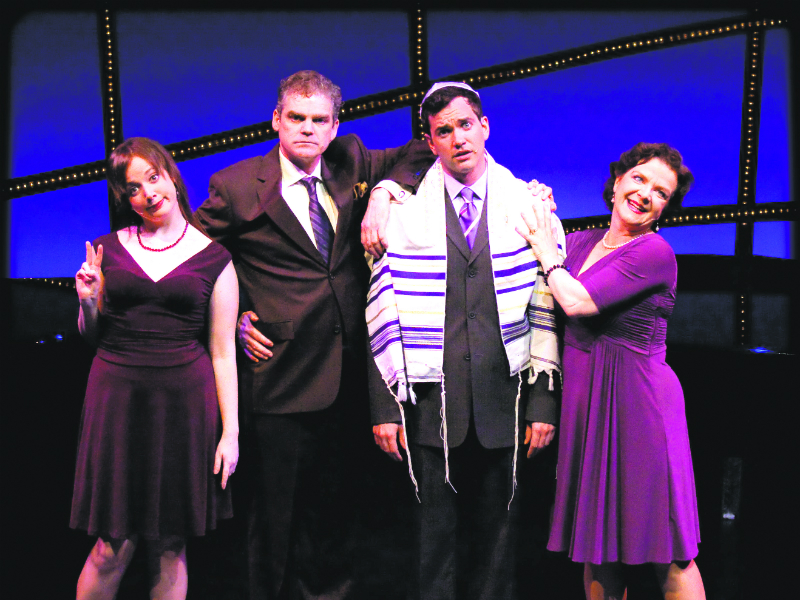Has anyone not been moved by the mega-hit Fiddler on the Roof? Who could resist Tevye’s heavenward questions, Yente’s pragmatic compromises or the touching Sabbath prayer scene? The lead role was brought to life by a host of Jewish actors, including Zero Mostel, Chaim Topol and Paul Michael Glaser (who also played the role of Perchik earlier in his career). The historical and geographic contexts make it a uniquely Jewish story, but its humour and humanity are universal. It’s not just great Jewish theatre, but just great theatre.
So what constitutes Jewish theatre? Does it have a specific anatomy? What drives professionals to focus on this niche? How do they define Jewish theatre and its role in the community? What motivates philanthropists to support Jewish theatre rather than myriad other causes?
While all theatre endeavours to engage the audience, Jewish theatre may also reflect, or challenge, Jewish tradition with contemporary views. For example, the Harold Green Jewish Theatre Company’s production of Mikveh and Gesher Theatre’s production of The Dybbuk were both recent provocative conversation starters.
In Dirty Dancing, Jerry Orbach portrays Jennifer Grey’s onscreen father, a Jewish doctor who saves the day. But few would classify that film as a Jewish story.
On the other hand, Toronto’s Tarragon Theatre recently presented a production called Old Stock: A Refugee Love Story, a “genre-bending music-theatre hybrid” featuring klezmer music performed by Ben Caplan, and inspired by the true story of playwright Hannah Moscovitch’s Romanian great-grandparents. The Tarragon is not a Jewish theatre, but a play can’t get more Jewish than that.
Jews figure prominently on the Canadian theatre scene. Business, philanthropy and impresario couple Aubrey and Marla Dan gave an endowment to Queen’s University’s School of Drama and Music after their daughter graduated, and have also founded Dancap Productions. There’s also the Mirvish theatre empire in Toronto. But these aren’t strictly Jewish theatre.
Meanwhile, in 2006, the Harold Green Jewish Theatre (HGJT) was born when Avery Saltzman and David Eisner, the company’s co-artistic directors, approached Greenwin executives Cary and Kevin Green with the idea for a Jewish theatre. In a time-honoured, heartfelt Jewish tradition, the brothers decided to honour their late father’s vitality and love of culture by creating a theatre in his name. Their mother, Miriam, has served on the board since its inception.
HGJT boasts a well-thought-out mandate, as well as vision and mission statements. It has a system in place to sift through the offerings that come its way, allowing it to curate the productions it stages.
“I really don’t think I devote my life to a cause,” says Saltzman. “What I devote my time and passion to is great theatre that tells a Jewish story. It’s an honour to produce works that resonate with our heritage, work that asks of ourselves who we are and what in life can we identify with and embrace.”
Saltzman feels that HGJT has grown tremendously. “Our work ethic and productions have always been exemplary, but what I’ve learned as we approach our bar mitzvah year is that our audience is our biggest ally. Having this growing family stay with us year after year is a continued testament to the theatre that David and I continue to be proud of.”
Eisner refers to the late Theodore Bikel, who graced the HGJT stage twice over the years. Bikel said: “In the world of theatre, there are others who from time to time do Jewish-themed plays; they may even do it well. But this is us, our turf, our theatre. We do it because it is we who were entrusted with its guardianship.”
Eisner says, “It’s been a wonderful journey, discovering with our audience entertaining, challenging, sometimes profound Jewish stories.
These stories have connected us all and enriched our lives as only great theatre can. It’s been an honour and privilege to have a part in it.”
Phyllis Feldman, artistic director and executive producer at Teatron Toronto Jewish Theatre, says “Choosing a play is like giving a gift – I have to love it if I expect others to.”
“My goal is to create a complete theatre experience for our audiences by presenting stories that will resonate either by personal experience or thematically in a Jewish context,” she says. “I also think that there are no degrees of separation among local or global Jewish communities, as depicted in our production of Arthur Miller’s Broken Glass, and the ongoing debate, nearly 70 years later, over The Story of Ethel and Julius Rosenberg.”
